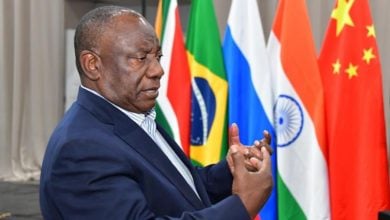Nomzamo Winfred Zanyiwe Madikizela-Mandela, better known as Winnie Mandela, was by Nelson Mandela’s side when he took his last breath in a Johannesburg hospital at age 95. Winnie was far more than Nelson Mandela’s wife. She always has been a force of uncompromising strength over decades in the struggle against Apartheid, holding firm despite the break-up of her family, physical torture and smear campaigns to assassinate her character.
Nelson Mandela was incarcerated for 27 of the 38 years he was married to Winnie. While he became the “face of the movement,” during that time Winnie and many other women provided key strategic and tactical leadership for the liberation movement on a day-to-day level.
A life in the struggle
Winnie’s Xhosa name is Nomzamo, which translates to “she who tries.” At a young age, despite the Apartheid limitations on Black people’s educational opportunities, Winnie earned a degree in social work and became the first Black medical social worker in Baragwanath Hospital in Johannesburg. Later, she earned her bachelor’s degree in international relations from the University of Witwatersrand.
Winnie stayed true to her name and continued to endure, transferring her determination to succeed educationally into the South African liberation movement. She campaigned for equal rights and joined the African National Congress shortly after her marriage to Nelson Mandela. She worked to build schools and clinics for African people in the region.
While Nelson Mandela was imprisoned, Winnie was exiled to the remote town of Branford for many years and confined there except for occasional visits to see her husband. In 1969, she was jailed in Pretoria Central Prison and placed under solitary confinement, where she was tortured and lived under the worst of prison conditions for 18 months. Pretoria was an especially brutal prison. It was said that the prison authorities executed up to seven people a day during this time.
She remained outspoken and unapologetic in her attack on white supremacy. In 1986, she refused to dissociate herself from “necklacing,” the practice of popular justice by which the oppressed of South Africa executed police informants and other enemies of the movement with tires and gasoline.
Moderate elements of the national liberation struggle often viewed Winnie Mandela as a political liability because of her radicalism. On the other side, many fighters in South Africa and activists worldwide were inspired by her uncompromising efforts, and began to follow her political statements closely.
Winnie was the First Lady of South Africa when Nelson became president in 1994, after the defeat of the white minority regime. During this period, she functioned as the Deputy Minister of Arts, Culture, Science and Technology.
Her marriage to Nelson Mandela ended on controversial terms, and she briefly stepped back from the national spotlight. However, even after the famous divorce, she was re-elected president of the Women’s League of the African National Congress. Winnie later fully returned to politics. She remains a significant political figure today, as both a member of Parliament and the ANC National Executive Committee.





